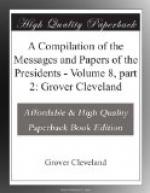The argument is based on a strained and impracticable view of the nature and powers of the National Government. It must execute its powers or it is no government. It must execute them on the land as well as on the sea, on things as well as on persons. And to do this it must necessarily have power to command obedience, preserve order, and keep the peace; and no person or power in this land has the right to resist or question its authority so long as it keeps within the bounds of its jurisdiction.
I have deemed it fitting and proper to quote thus largely from an important and elaborate opinion of the Supreme Court because the bill before me proceeds upon a construction of the Constitution as to the powers of the National Government which is in direct conflict with the judgment of the highest judicial tribunal of our country.
Under the sections of the present law above quoted officers of the United States are authorized, and it is their duty in the case of Congressional elections, to keep the peace at the polls and at the places of registration; to arrest immediately any person who is guilty of crimes against the United States election laws; to protect all officers of elections in the performance of their duties; and whenever an arrest is made to bring the person so arrested before a commissioner, judge, or court of the United States for examination of the offenses alleged against him. “Such special deputy marshals as are specially empowered thereto by the marshal in writing,” if forcibly resisted, may call to their aid the bystanders or posse comitatus. It is made a crime punishable with fine or imprisonment to hinder, assault, or otherwise interfere with the marshal or “his special deputies,” or to threaten or to attempt so to do. If any person appointed such special deputy marshal has taken the oath of office and thereafter neglects or refuses to fully discharge the duties of such office, he is punishable not only by removal from office, but by fine and imprisonment. The functions of the special deputy marshals now provided for by law being executive, they are placed under the authority of the well-known chief executive officer of the courts of the United States. They are in fact, and not merely in name, the deputies of the marshal, and he and his bondsmen are responsible for them. A civil force for the execution of the law is thus instituted in accordance with long-established and familiar usage, which is simple, effective, and under a responsible head.




